
The scope of agricultural startups is vast and growing. There are many areas where technology can be used to improve the efficiency, productivity, and sustainability of agriculture.
Agricultural startups are businesses that focus on introducing new and innovative solutions to address challenges and improve various aspects of the agricultural sector. They bring fresh ideas and technologies to make farming more efficient, sustainable, and profitable. Here’s a detailed explanation of the scope of agricultural startups:
Scope of Agriculture Startups
Farming Technology
Agricultural startups develop and use advanced technologies to make farming easier and more productive. They create tools like smart sensors, drones, and robots that can help farmers monitor their crops, save resources like water and fertilizers, and automate repetitive tasks.
Agricultural Inputs
These startups work on creating better and eco-friendly products that farmers need to grow crops. For example, they develop organic fertilizers and pesticides that are less harmful to the environment and improve soil health. By using these alternatives, farmers can grow healthier crops while reducing their dependence on chemicals.
Supply Chain and Logistics
Startups in this area focus on improving the process of getting agricultural products from farms to consumers. They develop technologies that help farmers store and transport their produce more efficiently, reducing wastage and ensuring freshness. They also create platforms that connect farmers directly with consumers, cutting out the middlemen and giving farmers better prices for their products.
Market Linkages and Agri-Financing
These startups work on connecting farmers with markets and providing them with financial services. They create online platforms where farmers can sell their produce directly to customers or businesses. They also develop financial tools like loans and insurance specifically designed for farmers, making it easier for them to access funds and manage risks.
Agri-Data and Analytics
Startups in this field use data and technology to help farmers make better decisions. They collect and analyze information about soil conditions, weather patterns, and crop growth, and provide insights to farmers. This helps farmers optimize their farming practices, such as when to plant, irrigate, or apply fertilizers, leading to higher yields and lower costs. Nutrients are most Important part of farming. also read Smart Nutrition Management and Important of Nutrients in Farming
Urban Agriculture and Vertical Farming
Some startups focus on growing food in urban areas where space is limited. They develop methods like vertical farming, where crops are grown in stacked layers, and hydroponics, which is a soil-less cultivation technique. These approaches allow for year-round production and help bring fresh food closer to urban consumers.
Sustainable and Alternative Farming
Startups in this area promote environmentally friendly farming practices. They encourage methods like organic farming, which avoids synthetic chemicals, and regenerative agriculture, which focuses on restoring soil health and biodiversity. These practices help protect the environment, enhance crop quality, and promote long-term sustainability.
Agricultural Education and Extension
Some startups focus on providing farmers with knowledge and training. They create digital platforms and mobile apps that offer guidance on farming techniques, pest management, and market trends. Farmers can access these resources to learn new skills, get advice, and stay updated with the latest agricultural practices.
Use Information Technology and AI for better data analysis and ideas implementation. Read more about Importance Of Information Technology and Advantages of using IT in Agriculture
How to start an agriculture startup?
Starting an agriculture startup can be an exciting and rewarding journey. Here is a step-by-step guide for how to start agriculture startup:
Find a Problem or Opportunity
Look for areas in agriculture where improvements can be made. It could be finding ways to increase crop yields, reduce waste, improve access to markets, or promote sustainable farming practices. Talk to farmers, observe the challenges they face, and identify an area where you can make a positive impact.
Develop a Business Plan
A business plan is like a roadmap for your startup. It helps you define your goals, target market, and strategies for success. It should include details about your product or service, how you will reach customers, the resources you’ll need, and how you plan to make money. Creating a solid business plan will guide your startup and attract potential investors.
Build a Team
Surround yourself with a team of passionate and talented individuals who share your vision. Look for people who have knowledge and skills in areas like agriculture, technology, marketing, and finance. Each team member should bring unique strengths and contribute to the growth of your startup.
Research and Development
Spend time researching and developing your idea. Learn about existing technologies and farming practices. Experiment and test your solutions on a small scale. Collaborate with farmers and experts to gather feedback and refine your product or service. This process will help you create something valuable and practical for the agricultural industry.
Secure Funding
Determine how much money you’ll need to start and grow your startup. Explore different funding options like grants, loans, competitions, or partnerships with investors. Prepare a compelling pitch that explains your idea, its potential, and why it’s worth investing in. Funding will provide the necessary resources to bring your startup to life.
Establish Partnerships
Connect with farmers, agricultural organizations, and other stakeholders in the industry. Collaborate with them to understand their needs and build partnerships that can support your startup. These partnerships can provide valuable insights, resources, and opportunities for growth.
Legal and Regulatory Compliance
Understand the legal and regulatory requirements for running an agricultural startup. This may include licenses, permits, certifications, and compliance with environmental and safety regulations. Seek guidance from experts to ensure you meet all the necessary legal obligations.
Launch and Grow
Once you’re ready, launch your startup and start marketing your product or service. Spread the word through social media, websites, and local events. Build relationships with farmers and gain their trust. As you gain customers and generate revenue, focus on scaling your operations, expanding your reach, and continuously improving your offerings based on feedback.
Keep Learning and Adapting
The agricultural industry is always evolving, so it’s essential to stay updated with the latest trends and innovations. Be open to adapting your strategies as you gain more knowledge and experience.
Get involved in the agricultural community. Attend industry events, meet with farmers, and learn as much as you can about the industry. This will help you to better understand the challenges that farmers are facing and develop solutions that meet their needs.
Be passionate about agriculture. Starting an agriculture startup is a lot of work, so it is important to be passionate about the industry. If you are not passionate about agriculture, it will be difficult to stay motivated when things get tough.
Be patient. It takes time to build a successful agriculture startup. Do not expect to become an overnight success. Be patient and persistent, and you will eventually achieve your goals.
Summary, agricultural startups are businesses that bring innovation and technology to agriculture. They work in various areas like farming technology, sustainable practices, supply chain, and market linkages. These startups aim to make farming more efficient, profitable, and sustainable, benefiting farmers, consumers, and the environment.
Starting an agriculture startup requires hard work, dedication, and a passion for making a positive impact in the industry. Embrace the challenges, stay curious, and never stop learning. With perseverance and the right mindset, you can create a successful startup that helps transform agriculture for the better.
Kalpesh Pathak
Related Posts

Important of Nutrients in Farming, Smart Nutrition Management for High Yield
Nutrients are really important for farming because they help plants grow and stay healthy. Different nutrients are needed by plants for...

The Future of Farming: Who will lead agriculture Farmers or Corporate?
The future of farming is full of exciting possibilities and advancements. While the future of agriculture holds both challenges and...
